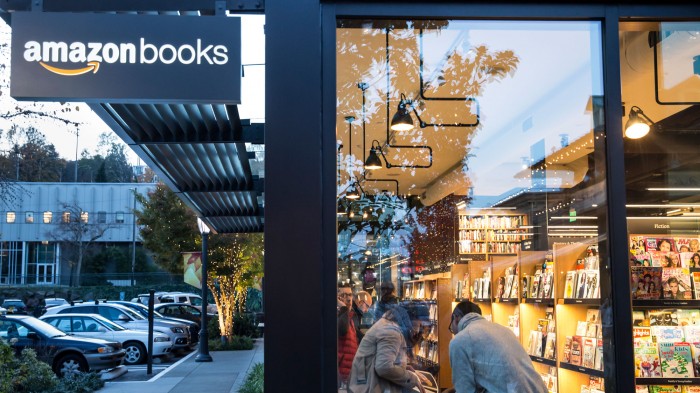The Jeff Bezos Retail Laboratory—or Seattle, as the Locals Say

In a bid to expand beyond e-tail, Amazon is currently launching one harebrained physical retail experiment after the next. A bodega without checkouts. A bookstore without price tags. A drive-up grocery shop.
But, the New York Times notes, all of these initiatives share a unifying theme: they invariably kick off in Amazon’s hometown of Seattle. In other words, the city has become a real-life laboratory—a proving ground in which Jeff Bezos’s underlings can establish whether a new retail business model is lucrative or simply ludicrous.
Many of its most recent trials are too young to have yielded meaningful results. Amazon’s new Go grocery store, for instance, in the Ballard region of the city, doesn’t have anywhere for customers to pay. Instead, shoppers scan their phone, pick up food from the shelf, and walk straight out, paying later because the company, thanks to a combination of sensors and computer vision, knows just what they took.
Similarly, the company’s first brick-and-mortar bookstore was situated in a mall in Seattle. The store does away with price tags on products—instead, customers must carry a book to a bar-code-scanning station or use their phone’s camera to find out how much something costs (members of Amazon Prime get a discount). Currently, it doesn’t feel particularly exciting—more like an annex to a website than the future of buying books.
And the drive-up grocery store? Well, it’s yet to actually serve a customer. (Though the company’s rather odd Treasure Truck, a kind of vending machine on wheels, has sold all kinds of trinkets at fire-sale prices.)
The experiments are surely useful for Amazon, and performing them on its own doorstep makes it easier and cheaper for the company to keep tabs on how they’re going. The New York Times also argues that Seattle is perhaps a better place to test such initiatives than many other cities: its citizens are fond of technology, but not as aggressively so as, say, people living in San Francisco.
But the newspaper also points out that some residents complain about the company’s plans, fail to understand what the point of the experiments is, and even boycott the shopping experiences altogether. Not all that dissimilar, really, to the trials that Amazon has to face online.
(Read more: New York Times, “Amazon’s Next Big Move: Take Over the Mall,” “Amazon’s Grocery Store Doesn’t Have a Single Checkout”)
Keep Reading
Most Popular
Large language models can do jaw-dropping things. But nobody knows exactly why.
And that's a problem. Figuring it out is one of the biggest scientific puzzles of our time and a crucial step towards controlling more powerful future models.
How scientists traced a mysterious covid case back to six toilets
When wastewater surveillance turns into a hunt for a single infected individual, the ethics get tricky.
The problem with plug-in hybrids? Their drivers.
Plug-in hybrids are often sold as a transition to EVs, but new data from Europe shows we’re still underestimating the emissions they produce.
Stay connected
Get the latest updates from
MIT Technology Review
Discover special offers, top stories, upcoming events, and more.